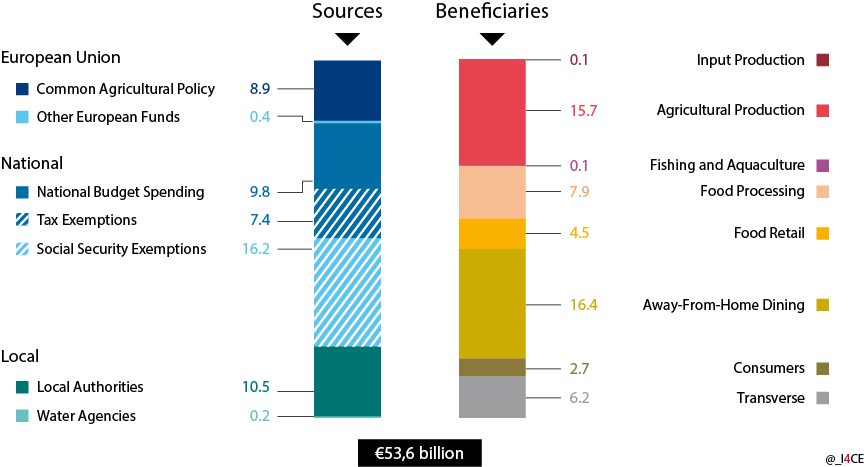Public spending in the French food system: which contributions to the ecological transition?
Report only available in French
Ecological transition of the food system raises numerous and complex questions regarding funding: How much does it cost? Who should pay? Do existing public spending contribute to it? This report aims to provide answers to the latter question.
In this report, we conduct as comprehensive a study as possible of public support for the French food system in 2018, 2021, and 2024. We analyse the theoretical contribution of this funding in relation to the national framework of ecological planning set by French public authorities.

Just over €50 billion in public funding for the food system
We have identified €53.6 billion in total public funding benefiting the French food system in 2024. For comparison, total food expenditure of French households amounts to approximately €300 billion.
This total has increased by 29% since 2018, which is slightly less than food inflation (+33%) but more than general inflation (+17%). This increase is largely driven by a widespread rise in social contribution exemptions, and to a lesser extent, by additional national budget expenditures.
Less than 10% of public funding supports ecological transition: an increase, but still insufficient
In 2024 in France, between €3.2 billion and €5 billion (6% to 9%) is favourable to ecological transition. These minimum and maximum figures reflect uncertainty due to sometimes imperfect information. With an additional €2.1 to €2.7 billion since 2018, this supportive funding has doubled or even tripled.
Despite this increase, the proportion of “green” funding is likely still insufficient. Some trends (stable meat consumption, slowing conversions to organic, etc.) suggest this, even though estimates of funding needs are still too rare to assert it categorically.
Moreover, it is not guaranteed that this upward trend will continue: some favourable tax exemptions will end in 2024, and budget cuts in national ecological planning measures are expected for 2025. The increase observed over the past seven years has precisely largely been driven by an increase in supportive funding from national budgets.
Without any significant additional supportive funding, to what extent could other funding be further redirected or conditioned in favour of ecological transition? Indeed, this delicate question arises for three-quarters of the funding (15% of the total being independent of ecological transition issues). While all sectors are concerned, the question is particularly pressing downstream (food industry, retail, commercial catering), where the share of favourable funding is almost negligible.
Public spending for the French food system and its contribution to ecological transition from 2018 to 2024

7% of funding is unfavourable and should be redirected, along with support mechanisms
A stable share of 7% (€3.8 billion) of public funding is opposed to ecological transition’ objectives: tax exemptions for fossil fuels and support for livestock based on the number of animals.
Ecological transition requires a gradual phasing out of these specific supports. However, this cannot occur without satisfactory accompanying mechanisms.
70% of funding in France is neither favourable nor unfavourable and could theoretically be redirected
Finally, 70% (about €37 billion) of public funding is classified as “Uncertain and Redirectable”: they cannot be considered as either favourable or unfavourable, nor as truly independent of transition issues. These funds could theoretically be redirected favourably, albeit with practical difficulties. Three main areas emerge.
Unsurprisingly, the bulk of funding linked to the Common Agricultural Policy is included here (around €9 billion). A delicate process of greening this funding is already underway and must be continued and amplified. Two main avenues emerge for this: a transfer of funding towards measures dedicated to ecological transition or an enhancement of environmental criteria for other existing supports (income, physical investments, etc.).
At the other end of the value chain, a comparable amount (€10 billion) directly or indirectly supports household food consumption. Here again, the ongoing greening process must be continued and amplified, particularly regarding public funding for collective catering. Proposals to adjust the restaurant voucher system to ecological transition objectives could also be examined, as well as more or less structural reforms of food aid policy.
Finally, the most substantial amount corresponds to exemptions from general levies supporting competitiveness, employment, and innovation (€15 billion). Aligning this funding with environmental objectives is still very little discussed, if at all. However, opening and deepening such a debate would be useful from the standpoint of public spending efficiency, considering both the significant amounts involved and the complexity of the implications for employment and competitiveness.


